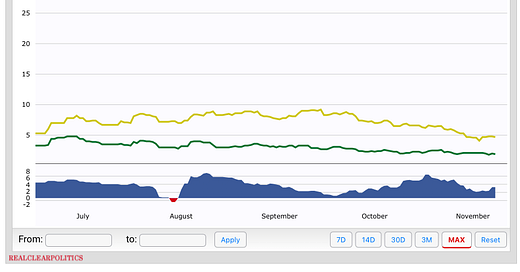Polls may be overestimating support for third-party candidates
Early strength for independents like Robert F Kennedy Jr is likely a mirage
The polls suggest that about 20% of Americans, on average, would support a third-party candidate for president if the election were held today. The average at RealClearPolitics — which I usually don’t recommend using but, in this case, is the only option (for now) — has Trump at 39% Biden at 36, Robert F Kennedy at 16 and Cornel West at 4. That would be the best showing for third-party candidates since 1992 when Ross Perot won 18.9% of the popular vote for president. But in our new era of high partisan polarization, is such a feat really possible? Do we buy these polls?
I can make two caveats right off the bat:
Polls today may not be reliably capturing vote intention for a variety of reasons. One theory is that partisans upset with their choices are saying they’d vote for a third-party candidate as a way to register their opposition to their party leaders, but wouldn’t really vote for them in reality.
It’s 305 days before the election, so don’t take results too seriously! (See chart below.)
The second point is worth briefly expanding on. It’s not just that we’re far out from the election so polls are imprecise, it’s that third-party candidates have tended to lose support over time in recent elections. I’m not sure what the political science explanation for this is, but the recent evidence is clear. Take the 2016 polls as the chief example. Then, aggregate support for Jill Stein and Gary Johnson declined from a peak of about 15 percent to just 7 percent on election day. (Cumulatively, the two won about 4 percent of the vote when al ballots were counted.)
One hypothesis is that as election day approaches, third-party voters become aware of the spoiler effect in plurality single-winner elections and abandon ship. This would be the rational tactical choice, after all; When voters are negatively polarized it’s more important that the candidate they dislike most loses than it is that the one they like most wins, even if they have reservations about them.
Of course not everyone is a partisan first. Some of the support for Kennedy today is real and his campaign may have staying power. But given that roughly 95% of Americans identify as a Republican or a Democrat or say they “lean toward” either party, my strong prior is that most support for the independents running for president will fall away as election day approaches.





